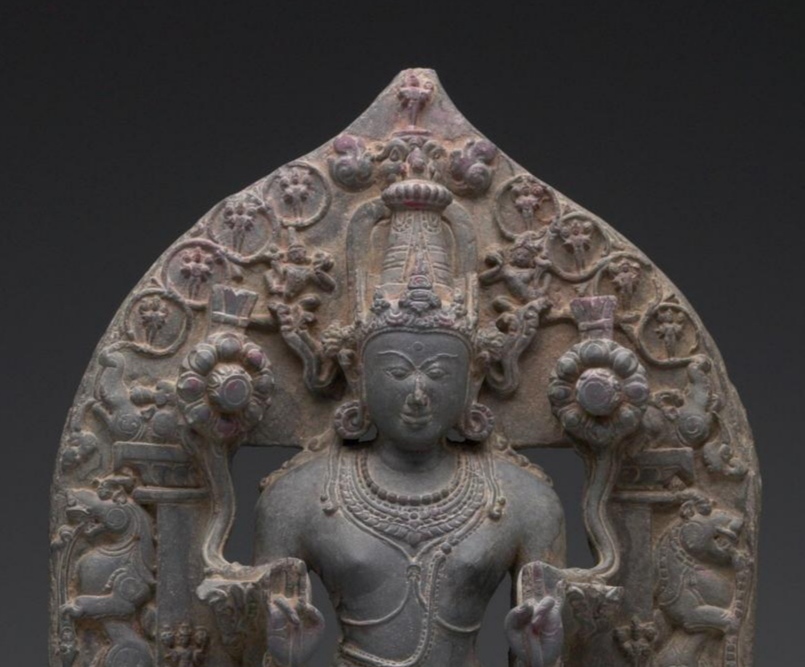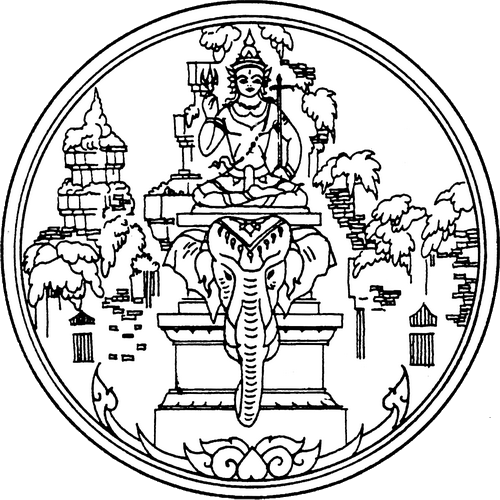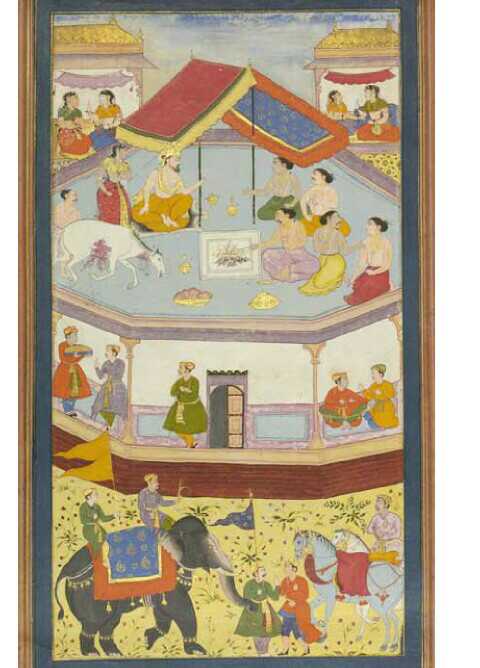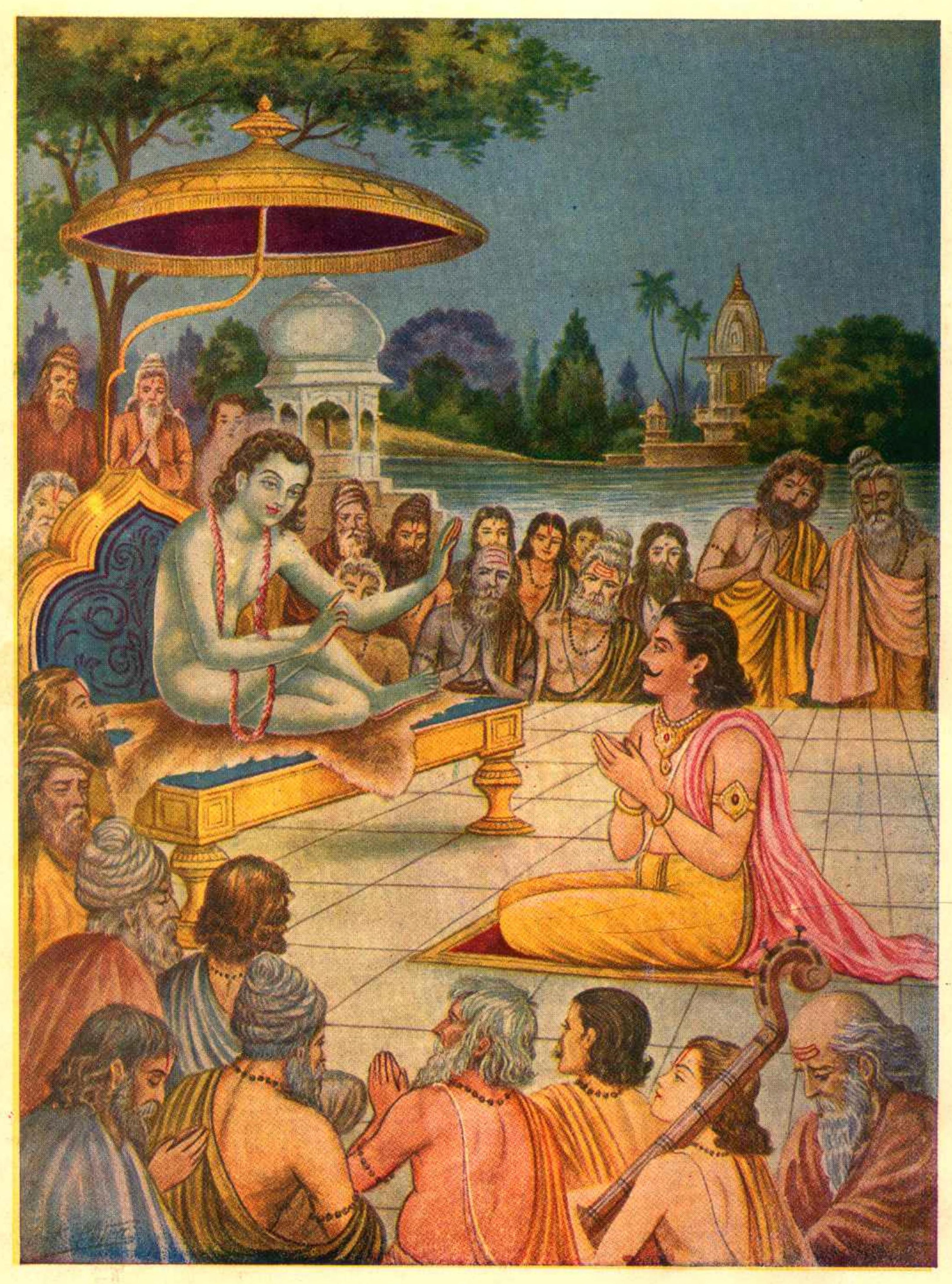|
Dhata
In Hinduism, Dhata () or Dhatr () is the name of the solar deity, one of the Adityas.Mani p. 232 He is also a god of health and magic. He is invoked in tantra by drawing tantras and chanting Vedic hymns. Often invoked during major yagnas such as Ashwamedha yagna. Dhata is evidenced as an Aditya in both Hindu epics - the ''Mahabharata'' and the ''Ramayana''. He is described to fought Arjuna and Krishna in burning of Khandava Forest episode in the epic ''Mahabharata''. The ''Bhagavata Purana The ''Bhagavata Purana'' (; ), also known as the ''Srimad Bhagavatam (Śrīmad Bhāgavatam)'', ''Srimad Bhagavata Mahapurana'' () or simply ''Bhagavata (Bhāgavata)'', is one of Hinduism's eighteen major Puranas (''Mahapuranas'') and one ...'' also mentions Dhata as the seventh son of Aditi and Kashyapa. In this text, he has four wives — Kuhu, Sinivali, Raka, and Anumati — who gave birth to his sons — Sayam, Darsha, Pratar and Purnamasa respectively. In the '' Agni Pur ... [...More Info...] [...Related Items...] OR: [Wikipedia] [Google] [Baidu] |
Adityas
In Hinduism, Adityas ( ) refers to a group of major solar deities, who are the offspring of the goddess Aditi. The name ''Aditya'', in the singular, is taken to refer to the sun god Surya. Generally, Adityas are twelve in number and consist of Vivasvan (Surya), Aryaman, Tvashtr, Savitr, Bhaga, Dhatr, Mitra, Varuna, Amsha, Pushan, Indra and Vishnu (in the form of Vamana). They appear in the ''Rig Veda'', where they are 6–8 in number, all male. The number increases to 12 in the ''Brahmanas''. The Mahabharata and the ''Puranas'' mention the sage Kashyapa as their father. In each month of the year a different Aditya is said to shine. Sun worship Characterisation The Aditya have been described in the Rig Veda as bright and pure as streams of water, free from all guile and falsehood, blameless, perfect. This class of deities has been seen as upholding the movables and immovable Dharma. Adityas are beneficent gods who act as protectors of all beings, who are pr ... [...More Info...] [...Related Items...] OR: [Wikipedia] [Google] [Baidu] |
Hindu Gods
Hindu deities are the gods and goddesses in Hinduism. Deities in Hinduism are as diverse as its traditions, and a Hindu can choose to be polytheistic, pantheistic, monotheistic, monistic, even agnostic, atheistic, or humanist.Julius J. Lipner (2009), Hindus: Their Religious Beliefs and Practices, 2nd edition, Routledge, , p. 8; Quote: "(...) one need not be religious in the minimal sense described to be accepted as a Hindu by Hindus, or describe oneself perfectly validly as Hindu. One may be polytheistic or monotheistic, monistic or pantheistic, even an agnostic, humanist or atheist, and still be considered a Hindu." The terms and epithets for deities within the diverse traditions of Hinduism vary, and include Deva (Hinduism), Deva, Devi, Ishvara, Ishvari, Bhagavan, Bhagavān and Bhagavathi, Bhagavati. The deities of Hinduism have evolved from the Vedic era (2nd millennium BCE) through the medieval era (1st millennium CE), regionally within Nepal, Pakistan, India and in Sout ... [...More Info...] [...Related Items...] OR: [Wikipedia] [Google] [Baidu] |
Mahabharata
The ''Mahābhārata'' ( ; , , ) is one of the two major Sanskrit Indian epic poetry, epics of ancient India revered as Smriti texts in Hinduism, the other being the ''Ramayana, Rāmāyaṇa''. It narrates the events and aftermath of the Kurukshetra War, a war of succession between two groups of princely cousins, the Kauravas and the Pandava, Pāṇḍavas. It also contains Hindu philosophy, philosophical and devotional material, such as a discussion of the four "goals of life" or ''puruṣārtha'' (12.161). Among the principal works and stories in the ''Mahābhārata'' are the ''Bhagavad Gita'', the story of Damayanti, the story of Shakuntala, the story of Pururava and Urvashi, the story of Savitri and Satyavan, the story of Kacha (sage), Kacha and Devayani, the story of Rishyasringa and an Ramopakhyana, abbreviated version of the ''Rāmāyaṇa'', often considered as works in their own right. Traditionally, the authorship of the ''Mahābhārata'' is attributed to Vyasa, Vy ... [...More Info...] [...Related Items...] OR: [Wikipedia] [Google] [Baidu] |
Ashwamedha
The Ashvamedha () was a horse sacrifice ritual followed by the Śrauta tradition of Vedic religion. It was used by ancient Indian kings to prove their imperial sovereignty: a horse accompanied by the king's warriors would be released to wander for a year. In the territory traversed by the horse, any rival could dispute the king's authority by challenging the warriors accompanying it. After one year, if no enemy had managed to kill or capture the horse, the animal would be guided back to the king's capital. It would be then sacrificed, and the king would be declared as an undisputed sovereign. The ritual is recorded as being held by many ancient rulers, but apparently only by two in the last thousand years. The most recent ritual was in 1741, the second one held by Maharajah Jai Singh II of Jaipur. The original Vedic religion had evidently included many animal sacrifices, as had the various folk religions of India. Brahminical Hinduism had evolved opposing animal sacrifices, ... [...More Info...] [...Related Items...] OR: [Wikipedia] [Google] [Baidu] |
Solar Gods
Solar may refer to: Astronomy * Of or relating to the Sun ** Solar telescope, a special purpose telescope used to observe the Sun ** A device that utilizes solar energy (e.g. "solar panels") ** Solar calendar, a calendar whose dates indicate the position of the Earth on its revolution around the Sun ** Solar eclipse, an eclipse of a sun in which it is obstructed by the moon ** Solar System, the planetary system made up by the Sun and the objects orbiting it * Solar Maximum Mission, a satellite * SOLAR (ISS), an observatory on International Space Station Music * "Solar" (composition), attributed to Miles Davis * ''Solar'' (Red Garland album), 1962 * ''Solar'' (Taeyang album), 2010 * ''Solar'', a 2011 album by Rubik * "Solar", a song by Northlane from '' Mesmer'', 2017 * "Solar", a song by Sault from ''Air'', 2022 * ”Solar”, a song by Stam1na from '' Taival'', 2018 * SOLAR Records, a record label Geography * Solar (Spanish term), a type of urban site * Solar, Coun ... [...More Info...] [...Related Items...] OR: [Wikipedia] [Google] [Baidu] |
Health Gods
Health has a variety of definitions, which have been used for different purposes over time. In general, it refers to physical and emotional well-being, especially that associated with normal functioning of the human body, absent of disease, pain (including mental pain), or injury. Health can be promoted by encouraging healthful activities, such as regular physical exercise and adequate sleep, and by reducing or avoiding unhealthful activities or situations, such as smoking or excessive stress. Some factors affecting health are due to individual choices, such as whether to engage in a high-risk behavior, while others are due to structural causes, such as whether the society is arranged in a way that makes it easier or harder for people to get necessary healthcare services. Still, other factors are beyond both individual and group choices, such as genetic disorders. History The meaning of health has evolved over time. In keeping with the biomedical perspective, early definit ... [...More Info...] [...Related Items...] OR: [Wikipedia] [Google] [Baidu] |
Agni Purana
The ''Agni Purana'', (, ) is a Sanskrit text and one of the eighteen major Puranas of Hinduism. The text is variously classified as a Purana related to Shaivism, Vaishnavism, Shaktism and Smartism, but also considered as a text that covers them all impartially without leaning towards a particular theology. The text exists in numerous versions, some very different from others. The published manuscripts are divided into 382 or 383 chapters, containing between 12,000 and 15,000 verses. The chapters of the text were likely composed in different centuries, with earliest version probably after the 7th-century,Thomas Green (2001). ''Martial Arts of the World: An Encyclopedia'', ABC-CLIO, , page 282 but before the 11th century because the early 11th-century Persian scholar Al-Biruni acknowledged its existence in his memoir on India. The youngest layer of the text in the ''Agni Purana'' may be from the 17th century. The ''Agni Purana'' is a medieval era encyclopedia that covers a diverse ... [...More Info...] [...Related Items...] OR: [Wikipedia] [Google] [Baidu] |
Anumati (deity)
In Hinduism, Anumati ("divine favor" in Sanskrit, Devanagari: अनुमति) is a lunar deity and goddess of spirituality. Her vehicle is ''Krisha Mrigam'' or ''Krishna Jinka'' (Blackbuck). ''Anumati'' is a word in Hindi Modern Standard Hindi (, ), commonly referred to as Hindi, is the Standard language, standardised variety of the Hindustani language written in the Devanagari script. It is an official language of India, official language of the Government ... meaning "permission" or "to grant permission". Anumati is the beholder of a formal activity of mother nature i.e. permission/s. As a basic discipline encapsulated in every creature in this nature of "permission of activities and events", Anumati makes it peaceful, childlike, and calm as the featured Moon; to the creatures of this universe which includes human beings on this planet. Anumati is seen as a personification or form of Shakti. Dhātā, the seventh son of Aditi, had four wives, named Kuhū, Sinīv� ... [...More Info...] [...Related Items...] OR: [Wikipedia] [Google] [Baidu] |
Bhagavata Purana
The ''Bhagavata Purana'' (; ), also known as the ''Srimad Bhagavatam (Śrīmad Bhāgavatam)'', ''Srimad Bhagavata Mahapurana'' () or simply ''Bhagavata (Bhāgavata)'', is one of Hinduism's eighteen major Puranas (''Mahapuranas'') and one of the most popular in Vaishnavism. Composed in Sanskrit and traditionally attributed to Veda Vyasa, it promotes '' bhakti'' (devotion) towards Krishna, an avatar of Vishnu, integrating themes from the Advaita (monism) philosophy of Adi Shankara, the Vishishtadvaita (qualified monism) of Ramanujacharya and the Dvaita (dualism) of Madhvacharya. It is widely available in almost all Indian languages. The ''Bhagavata Purana'', like other puranas, discusses a wide range of topics including cosmology, astronomy, genealogy, geography, legend, music, dance, yoga and culture. As it begins, the forces of evil have won a war between the benevolent '' devas'' (deities) and evil '' asuras'' (demons) and now rule the universe. Truth re-emerges as ... [...More Info...] [...Related Items...] OR: [Wikipedia] [Google] [Baidu] |
Khandava Forest
The Khandava Forest or Khandava Vana (Sanskrit: खाण्डव वन, ) or Khandavaprastha (; ) is a forest mentioned in the epic ''Mahabharata, Mahābhārata.'' It lay to the west of Yamuna river. The Pandava, Pandavas are described to have cleared this forest to construct their capital city called Indraprastha. This forest was earlier inhabited by Nāgas led by a king named ''Takshaka, Takṣaka''. Arjuna and ''Krishna, Kṛṣṇa'' are stated to have cleared this forest by setting it afire. The inhabitants of this forest were displaced. This was the root cause of the enmity of the ''Nāga'' Takshaka towards the Kuru Kingdom, Kuru kings who ruled from Indraprastha and Hastinapur, Hastinapura. Legend According to legend, Agni, the god of fire, needed to burn down the forest so that he could satisfy his hunger. There was no other thing that would have satisfied his hunger. The ''Mahabharata'' states that Indra was the protecting deity (''Deva (Hinduism), Deva'') of Khan ... [...More Info...] [...Related Items...] OR: [Wikipedia] [Google] [Baidu] |
Krishna
Krishna (; Sanskrit language, Sanskrit: कृष्ण, ) is a major deity in Hinduism. He is worshipped as the eighth avatar of Vishnu and also as the Supreme God (Hinduism), Supreme God in his own right. He is the god of protection, compassion, tenderness, and love; and is widely revered among Hindu divinities. Krishna's birthday is celebrated every year by Hindus on Krishna Janmashtami according to the lunisolar calendar, lunisolar Hindu calendar, which falls in late August or early September of the Gregorian calendar. The anecdotes and narratives of Krishna's life are generally titled as ''Krishna Līlā''. He is a central figure in the ''Mahabharata'', the ''Bhagavata Purana'', the ''Brahma Vaivarta Purana,'' and the ''Bhagavad Gita'', and is mentioned in many Hindu philosophy, Hindu philosophical, Hindu theology, theological, and Hindu mythology, mythological texts. They portray him in various perspectives: as a god-child, a prankster, a model lover, a divine hero, ... [...More Info...] [...Related Items...] OR: [Wikipedia] [Google] [Baidu] |
Arjuna
Arjuna (, , Help:IPA/Sanskrit, [ɐɾd͡ʒun̪ə]) is one of the central characters of the ancient Hindu epic ''Mahabharata''. He is the third of the five Pandava brothers, and is widely regarded as the most important and renowned among them. He is the son of Indra, the king of the Deva (Hinduism), gods, and Kunti, wife of King Pandu of Kuru kingdom, Kuru dynasty—making him a Demigod, divine-born hero. Arjuna is famed for his extraordinary prowess in archery and mastery over Astra (weapon), celestial weapons. Throughout the epic, Arjuna sustains a close friendship with his maternal cousin, Krishna, who serves as his spiritual guide. Arjuna is celebrated for numerous heroic exploits throughout the epic. From childhood, he emerges as an excellent pupil, studying under the warrior-sage Drona. In his youth, Arjuna wins the hand of Draupadi, the princess of the Pañcāla, Panchalas, by excelling in a formidable archery competition. Soon after, he goes on a journey during a period ... [...More Info...] [...Related Items...] OR: [Wikipedia] [Google] [Baidu] |







